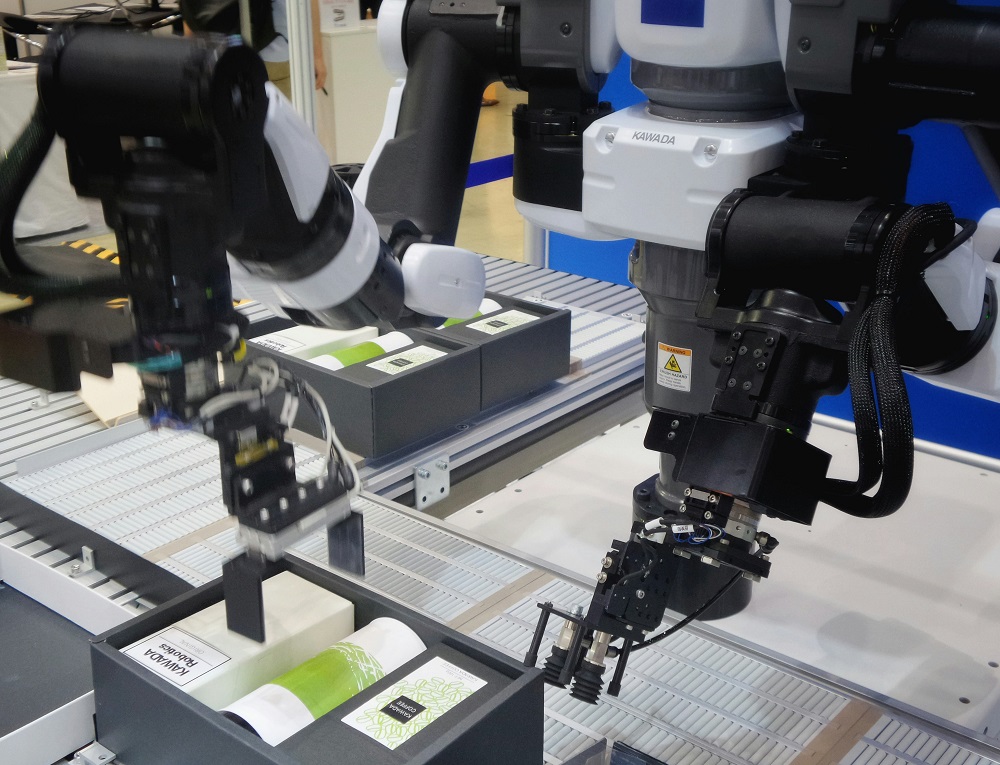Widely regarded as the Mecca of consumer technology, the Consumer Electronics Show (CES) 2024 captivated the global audience with a display of groundbreaking innovation and technological wonders. Over the years, the annual trade show has transformed into a significant occasion, establishing standards for the future of the tech industry. In 2024, retail revenues for the US consumer technology industry are expected to increase by 2.8% to reach $512 billion, signaling a potential rise in consumer spending on technology products and services, according to the Consumer Technology Association (CTA). Featuring more than 4,300 exhibitors, including over 1,400 startups, CES 2024 showcased the capabilities and developments of modern technology, highlighting its integration into crucial aspects of our daily lives.
Artificial Intelligence (AI) and Robotics
AI and machine learning took center stage in discussions at CES 2024. The event witnessed the revitalization of existing products through the integration of AI and the introduction of new products designed to facilitate interaction with emerging generative AI tools. Notable innovations in voice assistants and personal robots marked a substantial leap in industry expectations for future developments. Amazon unveiled a novel generative AI-powered Alexa experience, elevating engagements with the voice assistants. LG revealed a sophisticated smart home robot with two-legged mobility, user recognition, and seamless integration with smart appliances, utilizing AI and machine learning to enhance household tasks. Samsung's Ballie personal assistant robot, equipped with an onboard projector and advanced AI capabilities, transforms into a pet-like companion adaptable to user needs and preferences.
Read more: Private Investments to Bridge the Climate Funding Gap
CES 2024 also featured innovations that leveraged AI to address daily challenges and bridge access gaps to support underrepresented communities. Motionsleep's Motion Pillow, employing AI technology, tackles snoring by detecting and adjusting the user's head position with airbags, enhancing sleep quality. Cappella's AI-powered phone app, with 95% accuracy in translating baby cries, emerged as a revolutionary tool for parents, employing machine learning to identify a baby's needs and potentially offering relief to parents globally. GUIDi launched an AI smart belt designed for the visually impaired, featuring a personal navigation system that functions independently of the internet or GPS. Garmin's Venu 3 fitness watch includes a wheelchair mode, enabling the tracking of movements as pushes instead of steps, along with access to wheelchair-oriented activities and challenges.

Health Technology
CES 2024 presented significant advancements in healthcare technology, with a strong focus on preventive care and early diagnosis. According to a study in the Journal of the American College of Radiology, 85% of venture capital funding in digital health was directed toward medical imaging, suggesting an anticipated increase in funding for AI products. A report from Morgan Stanley predicted a rise in the industry's average budget allocation for these technologies from 5.7% in 2022 to 10.5% in 2024, indicating substantial industry growth. The event showcased technologies ranging from wearable health monitors and telemedicine platforms to AI-powered medical devices, underscoring the expanding role of technology in enhancing patient care and healthcare delivery.
Read more: 2024 Macroeconomic Outlook: Unpacking Economic Trends
CES 2024 emphasized the prominence of wearable health monitors, offering insights into a patient's well-being and enabling early detection of potential health issues for proactive chronic condition management. Notably, ElectronRx launched foneDx, a technology that transforms smartphones into home health monitors with a focus on heart and lung health. Telemedicine platforms, highlighted at the event, played a critical role to bridge the gap between healthcare providers and patients, further enhanced by the integration of AI and machine learning. Humetrix, for instance, introduced its global health communication platform utilizing AI to translate medical terms into over 20 languages. Moreover, CES 2024 introduced revolutionary AI-powered diagnostic tools, such as Intuition Robotics' AI-enabled ElliQ care companion robot and EssilorLuxottica's Nuance Audio glasses, designed to aid individuals with hearing loss. These innovations signify a transformative shift in healthcare towards accurate and accelerated diagnoses, surpassing traditional methods.

Entertainment Technology
In 2024, consumers are projected to allocate $14 billion, up 6% year-on-year, towards audio streaming services and $48 billion, up 4%, on video streaming, according to the CTA. CES 2024 showcased an awareness of this trend, placing streaming products in the spotlight. Transparent TVs generated considerable excitement, laying the groundwork for a futuristic viewing experience. LG, the South Korean consumer electronics giant, unveiled the "invisible" LG Signature OLED TV, which appears see-through when turned off and is enhanced by the company's wireless technology for audio-visual transmission. Similarly, Samsung introduced its transparent OLED TV, a transparent MicroLED, and a transparent LCD.
With advancements in tablets and augmented and virtual reality products, the gaming industry is expected to experience a 12% surge in subscription services, reaching $3.5 billion in 2024, per the CTA. Additionally, the adoption of generative AI is poised to enhance the gaming experience while also assisting developers in expediting the release of games to the market. NVIDIA took the lead by introducing the latest versions of their gaming GPUs, aiming to enhance gaming performance and serve as the foundation for AI-powered PCs, unlocking a new realm of potential for the industry. Substantial progress was also achieved in hardware products. Samsung unveiled a 3D monitor providing a VR gaming experience without the need for a headset. HP's Omen Transcend 14 laptop claimed the title of the most powerful and slim laptop, while the Acer Predator Helios 18 and Razer Blade 16 were acknowledged as significant step-ups for demanding gaming and creative tasks.
Read more: App Store Monopoly Contested: Value Shifts Towards Application Layer

Mobility Technology
Recent entrepreneurial discussions have revolved around advancements in transportation, with companies and startups actively pursuing and developing technologies such as automated driving, electric vehicles, AI software, aviation, boats, drones, micro-mobility, and more. The global mobility-as-a-service market is expected to experience a remarkable compound annual growth rate of 32.2%, increasing from $5.7 billion in 2023 to $40.1 billion in 2030, according to MarketsandMarkets. The transition to electric and autonomous vehicles holds the promise of a more environmentally friendly and secure future for transportation, and prominent automakers like Kia, Honda, and Mercedes-Benz showcased electric concepts during the event. In terms of EV charging stations, WiTricity debuted a novel wireless charging technology in addition to the better-known charging infrastructure. The potential of generative AI within the ecosystem is vast, with applications ranging from in-vehicle sensors and car voice assistants to autonomous driving systems, which was realized through the summit. Volkswagen announced plans to integrate an AI-powered chatbot into all models equipped with its voice assistant, while BMW collaborated with Amazon to leverage generative AI powered by the Alexa LLM, enhancing the automaker's voice assistant with greater capabilities and a more human, conversational delivery of information. The event also highlighted numerous innovations in electric vertical takeoff and landing (eVTOL) and delivery technologies, signaling progress toward efficient and sustainable urban transportation. Hyundai introduced the S-A2 eVTOL aircraft for urban air mobility, which is scheduled for launch in 2028. Additionally, Mobinn, a Hyundai spin-off, showcased a stair-navigating delivery robot already undergoing testing in Korea.
Read more: Top Four Sectors to Watch Out for in 2024
CES 2024, a pinnacle of consumer technology, showcased groundbreaking innovations and technological wonders, setting standards for the industry's future. With expected retail revenue growth in the US consumer technology industry, AI and machine learning dominated discussions, rejuvenating existing products and introducing new ones. Health technology saw innovations primarily focused on preventative care and early diagnosis. Entertainment technology highlighted an uptick in streaming trends and gaming advancements. The event also addressed mobility technology, including electric vehicles, AI in transportation, and innovations in eVTOLs and delivery technologies.
SG Analytics, recognized by the Financial Times as one of APAC's fastest-growing firms, is a prominent insights and analytics company specializing in data-centric research and contextual analytics. Operating globally across the US, UK, Poland, Switzerland, and India, we expertly guide data from inception to transform it into invaluable insights using our knowledge-driven ecosystem, results-focused solutions, and advanced technology platform. Our distinguished clientele, including Fortune 500 giants, attests to our mastery of harnessing data with purpose and merging content and context to overcome business challenges. With our Brand Promise of "Life's Possible," we consistently deliver enduring value, ensuring the utmost client delight.
Partner of choice for lower middle market-focused Investment Banks and Private Equity firms, SG Analytics provides offshore analysts to support across the deal life cycle. Our complimentary access to a full back-office research ecosystem (database access, graphics team, sector & and domain experts, and technology-driven automation of tactical processes) positions our clients to win more deal mandates and execute these deals in the most efficient manner.









